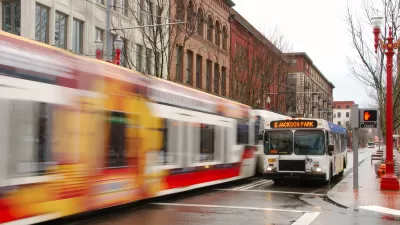A raft of recent research finds that small, local businesses are critical to overcoming many of our biggest challenges. This article rounds up the new studies and what they say about why local business should be a focus of planning in 2016.
It's the season of resolutions, and a raft of recent research suggests that creating a better environment for locally owned businesses to succeed ought to be at the top of every public official's list of priorities. The findings come from prominent economists, sociologists, and other researchers, and suggest that small, local businesses are critical to overcoming many of our biggest challenges, from reducing economic inequality to building resilient communities.
In this article, the Institute for Local Self-Reliance rounds up the new studies and what they say about why local business should be a focus of planning and economic development in 2016.
1. Fewer new businesses are starting, and that's bad news for long-term job creation.
Employment is finally on the rebound, but high rates of underemployment and minimal wage growth suggest all is not well in the U.S. job market. One disturbing trend may be to blame: the creation of new businesses has fallen sharply. While startups accounted for 16 percent of all businesses in the late 1970s, that share has fallen by half, to 8 percent, explains a new brief from the Kauffman Foundation.
The brief also explains why that’s so troubling. The authors round up the recent research on firm age and job creation, and find that young firms are the major contributor of new jobs to the U.S. economy. “New businesses account for nearly all net new job creation and almost 20 percent of gross job creation,” they write, adding, “companies less than one year old have created an average of 1.5 million jobs per year over the past three decades.” While no one is certain what’s caused the drop in new businesses, the same policies and conditions that have made it harder for small, local businesses to succeed may well be impeding new entrepreneurs.
Continue reading at the link below.
FULL STORY: New Studies Reveal 5 Reasons Policymakers Should Prioritize Local Business in 2016

Planetizen Federal Action Tracker
A weekly monitor of how Trump’s orders and actions are impacting planners and planning in America.

Maui's Vacation Rental Debate Turns Ugly
Verbal attacks, misinformation campaigns and fistfights plague a high-stakes debate to convert thousands of vacation rentals into long-term housing.

Restaurant Patios Were a Pandemic Win — Why Were They so Hard to Keep?
Social distancing requirements and changes in travel patterns prompted cities to pilot new uses for street and sidewalk space. Then it got complicated.

In California Battle of Housing vs. Environment, Housing Just Won
A new state law significantly limits the power of CEQA, an environmental review law that served as a powerful tool for blocking new development.

Boulder Eliminates Parking Minimums Citywide
Officials estimate the cost of building a single underground parking space at up to $100,000.

Orange County, Florida Adopts Largest US “Sprawl Repair” Code
The ‘Orange Code’ seeks to rectify decades of sprawl-inducing, car-oriented development.
Urban Design for Planners 1: Software Tools
This six-course series explores essential urban design concepts using open source software and equips planners with the tools they need to participate fully in the urban design process.
Planning for Universal Design
Learn the tools for implementing Universal Design in planning regulations.
Heyer Gruel & Associates PA
JM Goldson LLC
Custer County Colorado
City of Camden Redevelopment Agency
City of Astoria
Transportation Research & Education Center (TREC) at Portland State University
Jefferson Parish Government
Camden Redevelopment Agency
City of Claremont





























